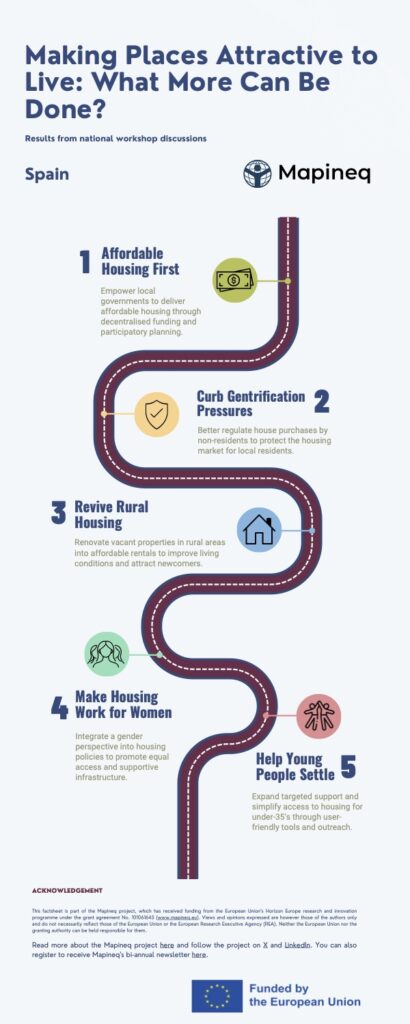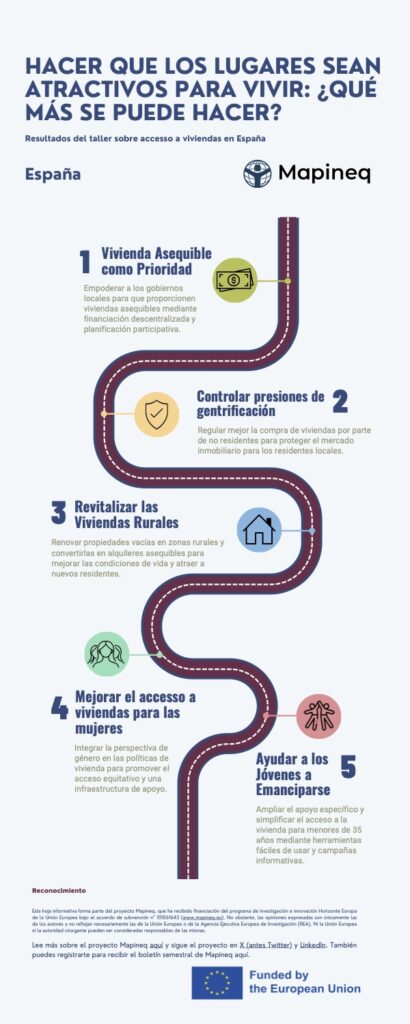


Event review
The Webinar “Reviving Regions: Building a Future Where People Can Afford to Stay”, held on 01 April 2025 in the framework of the Mapineq project, explored territorial inequalities and inequalities in the housing market. Experts discussed best practices in addressing local challenges and opportunities for growth, collaboration, and revitalisation within disadvantaged communities, particularly in rural Spain.
You can watch the presentations and discover key recommendations at our factsheet.
Speakers:
- Fabrizio Bernardi, Professor of Sociology, National Distance Education University (UNED).
- Blanca Casares Guillén, Policy Expert and Project Manager of Horizon Europe Projects at the European Association for Innovation in Local Development (AEIDL).
- Javier Martín Olmos, Director of the Local Action Group Sorian Lands of El Cid.
- Juan Antonio Módenes, Professor at the Department of Geography of the Universitat Autònoma de Barcelona, and Senior Researcher at the Centre for Demographic Studies.
- Marta Moras González, BA Student in Sociology and Student Representative at the University of Salamanca.
Key Discussion Themes and Actionable Recommendations
1- Meeting Spain’s Housing Challenge with National-Level Strategies
– Housing represents a cross-cutting challenge in Spain, affecting both urban and rural areas, and people of all ages, genders and socioeconomic levels.
– A Mapineq survey with about 2,000 respondents reveals a widespread consensus: affordable housing, along with access to green spaces, active cultural life, short waiting times in healthcare and low levels of crime and unemployment, are determining factors making places attractive.
– For young people, affordable housing is the most important attractive feature when asked where they would prefer to live. Policies that improve these aspects would enjoy broad citizen support, regardless of demographic differences.
– Action Point: Establish a national framework to empower local governments to implement affordable housing initiatives by decentralising resources and decision-making. Integrate participatory budgeting to enhance community involvement and transparency in housing projects.
2- Breaking the Gentrification Cycle
– The increasing cost of housing in urban environments is generating a domino effect that also affects rural areas. The purchase of second homes in villages—often by the same individuals who rent in big cities—drives up local prices and displaces original inhabitants, contributing to a cycle of gentrification that expands territorial inequalities and makes access to housing even more difficult for young people and groups with fewer resources.
– Action point: Develop specific protected housing programmes for local residents and implement specific regulations for second homes in rural areas.
3- Investing in Quality Housing
– Investment in quality housing and expanding public support for rehabilitation are fundamental elements for revitalising rural Spain. The housing stock in large rural areas often presents poor living conditions, with high rates of empty and ruined properties.
– Projects like “Rural Habitat” demonstrate that the rehabilitation of municipal housing for rental not only improves habitability conditions but also recovers local heritage and generates economic activity in small localities.
– Action point: Implement a national program to rehabilitate vacant and deteriorated properties in rural areas, transforming them into affordable rental housing to attract new residents and stimulate local economies.
4- Strengthening Women’s Access to Housing
– Women face specific obstacles in accessing housing, particularly in rural areas, from inequalities in land ownership to wage gaps and work-life balance issues. Traditional inheritance models and cultural norms have perpetuated these disadvantages, while the lack of gender-disaggregated data makes it challenging to formulate specific policies.
– Action point: Incorporate the gender perspective into national and regional housing strategies. Promote increased access to housing for women, including in rural areas, as a key policy objective, alongside associated services and infrastructure.
5- Empowering Youth
– Spanish youth face unprecedented challenges in accessing housing, with an average emancipation age of 30, significantly higher than countries like France (23) or Germany (24). This situation generates uncertainty and a state of hopelessness, as for many young people the possibility of purchasing their own home seems inconceivable. Although initiatives are underway, the widespread perception is that they do not effectively reach this group or there is inadequate information about them.
– Action Point: Develop user-friendly digital platforms to centralise information on housing assistance for young people and enhance outreach efforts. Expand subsidised housing programmes with dedicated quotas for under-35s, ensuring accessibility through simplified application processes and targeted awareness campaigns.
This article is based on this post, first published on Population Europe.
